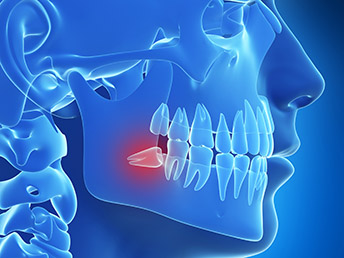wisdom teeth removal
Wisdom teeth are the third permanent molars that grow in the back of your mouth. They are the last teeth to grow, with most people’s wisdom teeth coming in between the ages of 16 and 23. In some cases, wisdom teeth removal is required because the teeth may not have formed properly or perhaps the dentist feels they could cause problems in the near future, such as compromising adjacent teeth. The procedure itself is not complicated, but it can be painful. However, the relief you will feel afterwards will be more than worth it, especially if you are dealing with impacted wisdom teeth in which your molars have not managed to break through your gums, causing swelling, irritation and even possibly infection.
do i need to get my wisdom teeth removed?
Having your wisdom teeth removed is not always necessary. If your wisdom teeth have erupted properly through the tissue of your gums and aren’t harming the adjacent teeth, then you can keep your new molars as long as you can clean them properly. If effective hygiene isn’t possible, you run the risk of your wisdom teeth decaying over time.
A wisdom tooth extraction is recommended if the tooth has only partially erupted through the gum, leading to inflammation and infection. When the tooth partially erupts through the gum, it often means there’s a flap of tissue over the tooth. This creates a space that is difficult to clean. Bacteria can eventually become trapped in this space, leading to an infection known as pericoronitis.
Pericoronitis can also develop if your lower jaw doesn’t have enough room for the extra teeth trying to grow out. Pericoronitis symptoms include inflamed gums behind your molars, bad taste and/or smell, pain and sometimes pus draining from the area. If you experience any of these symptoms, you should book an appointment right away because we might have to remove wisdom teeth immediately to avoid further problems.
There are many situations in which wisdom teeth removal is a good idea but it differs from one person to the next, which is why your best option is to come and see us. An experienced dentist will be able to tell you if your wisdom teeth will be healthy or if they need to be removed.
the wisdom teeth removal procedure
If you are suffering from intense pain and are having trouble swallowing, it means we will have to get your wisdom teeth out as soon as possible. However, if you have an infection, we will have to treat the infection with antibiotics before we can perform the procedure to avoid the spreading of infection.
Your wisdom tooth extraction will be performed by one of our highly trained and experienced dentist. You will be given a local anesthetic to numb the area and to ensure that you don’t feel pain. If yours is an especially difficult case, you might be given a general anesthetic to ensure you feel absolutely no discomfort during procedure.
Subsequently, we will make a small cut in your gum to expose the tooth and bone underneath. We will then remove any bone that might be blocking access to the tooth to ensure it can be cleanly removed from its socket. The tooth may be removed as is or it may have to be broken up into smaller pieces for ease of removal. Once the tooth is out, we will clean the area thoroughly to get rid of any bone or tooth debris. Depending on the case, we might have to stitch the wound to help you heal faster. A piece of gauze will be placed over the wound to keep bleeding at a minimum and to ensure the area clots properly.
wisdom tooth removal aftercare
Wisdom tooth recovery is generally quite quick. If we used a general anesthetic, you will be taken to a recovery room. If you’ve only had local anesthetic, you will be ready to go almost as soon as the procedure is over. We will provide you with detailed instructions including what you may eat or drink, activity levels, pain management and more. However, you can expect to spend the rest of the day resting, so don’t plan on resuming existing work activities.
Drinking plenty of water after the procedure is highly recommended while avoiding other beverages including coffee and alcohol for up to 24 hours after the procedure. Also, avoid using a straw for up to a week as it could cause the area to start bleeding again. The degree of pain you will experience depends on the complexity of the procedure as well as your personal tolerance levels. We will recommend either an OTC pain medication or a prescription drug, depending on your specific situation.
Don’t be surprised if the area continues to bleed a little in the first 24 hours after the procedure. Additionally, you might experience some swelling and bruising in your cheek, but this usually passes within a few days. Just apply an ice pack to to the area.
In terms of cleaning your mouth, it’s advisable that you don’t brush your teeth or use mouthwash during the first 24 hours. After that, we will provide you with a detailed wisdom tooth removal aftercare program.
Wisdom teeth removal might not be necessary in every case, but in other situations it’s simply unavoidable. Your best option is to book an appointment so we can discuss the particulars of your case. Of course, if you are experiencing severe pain, then the sooner you come in, the faster we can solve your problem and give you back your pain-free life.

